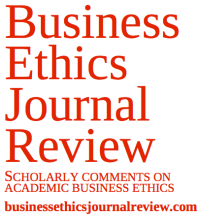Monthly Archives: April 2016
Clarity About Whistleblower Protections May Scare off Whistleblowers
This reminds us somewhat of the way safety procedures on planes remind us of risk. When the flight attendant explains the procedure to follow “in case of a water landing,” that tends to remind us that sometimes planes crash-land on
Clarity About Whistleblower Protections May Scare off Whistleblowers
This reminds us somewhat of the way safety procedures on planes remind us of risk. When the flight attendant explains the procedure to follow “in case of a water landing,” that tends to remind us that sometimes planes crash-land on
Is Engineering (or Business) Education Anti-Entrepreneurial?
This piece on France’s confusion (and often conflation) of engineering with entrepreneurship is fascinating on its own terms, but it also offers indirectly a criticism of business education that can be cast illuminatingly in terms of virtue ethics. Like France’s
Is Engineering (or Business) Education Anti-Entrepreneurial?
This piece on France’s confusion (and often conflation) of engineering with entrepreneurship is fascinating on its own terms, but it also offers indirectly a criticism of business education that can be cast illuminatingly in terms of virtue ethics. Like France’s
Is It Strange That 70% of U.S. Corporations Paid No Income Taxes?
One of the present writer’s pet peeves with the business ethics literature is its conception of ‘business’. In thinking about business, the business ethics literature focuses almost exclusively on outliers among outliers among outliers. First, it focuses on successful firms,
Is It Strange That 70% of U.S. Corporations Paid No Income Taxes?
One of the present writer’s pet peeves with the business ethics literature is its conception of ‘business’. In thinking about business, the business ethics literature focuses almost exclusively on outliers among outliers among outliers. First, it focuses on successful firms,
Are Pharmacies Putting Profits Over Patient Care?
In the piece linked below, pharmacist and health policy expert Scott Gavura examines the ethical questions that arise at the intersection between a for-profit enterprise (a drugstore or pharmacy) and a professional group (pharmacists) with a sworn obligation to the
Are Pharmacies Putting Profits Over Patient Care?
In the piece linked below, pharmacist and health policy expert Scott Gavura examines the ethical questions that arise at the intersection between a for-profit enterprise (a drugstore or pharmacy) and a professional group (pharmacists) with a sworn obligation to the
What if You Realize Your Product Doesn’t Work?
Not every product being sold is a good one. Sometimes the sellers of bad products know that’s what they’re selling, and sometimes they don’t. People in the former category are clearly acting unethically. People in the latter category — well,
What if You Realize Your Product Doesn’t Work?
Not every product being sold is a good one. Sometimes the sellers of bad products know that’s what they’re selling, and sometimes they don’t. People in the former category are clearly acting unethically. People in the latter category — well,
Do Supportive Bosses Mean Loyal Employees?
Cynicism among office workers is often taken to be the norm. (That’s why so much of what goes on in TV shows like The Office seems so familiar to so many of us.) But the important question: is cynicism harmful?
Do Supportive Bosses Mean Loyal Employees?
Cynicism among office workers is often taken to be the norm. (That’s why so much of what goes on in TV shows like The Office seems so familiar to so many of us.) But the important question: is cynicism harmful?
The Uber Wars: Is “Surge” Pricing “Harassment” or a Consumer Choice Enhancement?
The present writer finds it interesting to juxtapose this news account of the furor in India over Uber’s (and, apparently, local competitor Ola’s) peak-load (or “surge”) pricing with his own experience this afternoon. Uber employs peak-load pricing to equilibrate the
The Uber Wars: Is “Surge” Pricing “Harassment” or a Consumer Choice Enhancement?
The present writer finds it interesting to juxtapose this news account of the furor in India over Uber’s (and, apparently, local competitor Ola’s) peak-load (or “surge”) pricing with his own experience this afternoon. Uber employs peak-load pricing to equilibrate the
Stephen L. Carter: If You Like NC Corporate Boycotts, You Favor Corporate Free Speech Rights
This piece by Yale law professor Stephen L. Carter is an interesting contribution to the debate over corporate personhood and the legal and constitutional rights that attach to corporate entities. Carter’s commentary and its included hypothetical case scenario militate toward
Stephen L. Carter: If You Like NC Corporate Boycotts, You Favor Corporate Free Speech Rights
This piece by Yale law professor Stephen L. Carter is an interesting contribution to the debate over corporate personhood and the legal and constitutional rights that attach to corporate entities. Carter’s commentary and its included hypothetical case scenario militate toward
Why Hurt NC Businesses Over NC’s Transgender Bathroom Law?
Boycotts are notorious blunt instruments of change. Boycotts try to change an organization’s behaviour by imposing financial sanctions in the form of a reduction in business income. Inevitably, innocent parties get hurt. The author of the piece below is pointing
Why Hurt NC Businesses Over NC’s Transgender Bathroom Law?
Boycotts are notorious blunt instruments of change. Boycotts try to change an organization’s behaviour by imposing financial sanctions in the form of a reduction in business income. Inevitably, innocent parties get hurt. The author of the piece below is pointing
Equal Pay Day: What Does the Gender Pay Gap Actually Tell Us?
Although polemical, this piece by American Enterprise Institute economist Mark J. Perry invites its reader to engage in critical thinking about what the gender pay gap – the percentage difference in median earnings between men and women – does and
Equal Pay Day: What Does the Gender Pay Gap Actually Tell Us?
Although polemical, this piece by American Enterprise Institute economist Mark J. Perry invites its reader to engage in critical thinking about what the gender pay gap – the percentage difference in median earnings between men and women – does and



Recent Comments